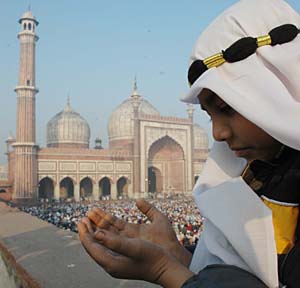|
Travel Sites Visit
Goa, Karnataka,
Kerala, Tamil
Nadu, Andhra Pradesh |
Eid-ul-Zuha
celebrated with fervour and gaiety
Vikram
Vishal/Sushil Pareek/Kamna Hajela Mathur
 |
|
Namaz
at Jama Masjid in New Delhi on Id
|
New
Delhi /Mumbai/Lucknow:
Millions of devotees attended special Eid
(Id) prayers on Wednesday as the festival of Eid-ul-Zuha signifying the
feast of sacrifice was celebrated across the country. They offered prayers
and embraced each other, signifying universal brotherhood. Eid-ul-Zuha,
also known as Eid ul Azha or Baqr-e-Eid or Bakrid is celebrated to mark
the end of pilgrimage to the Muslim holy city of Mecca in Saudi Arabia.
In New Delhi, devotees assembled at the 17th century Jama Masjid in the city's old quarters to offer Eid namaz'. People in Mumbai and Lucknow also offered prayers to mark the festival. "Eid teaches us to live as God wants us to and remove all the bad habits that we have and live according to his teachings," said Abul Wafa Kasmi, a devout. In Kerala's Kozhikode area, Muslims assembled at mosques and at specially set up Id-gahs early this morning for a prayer meeting or 'Niskaram'. After offering the prayers, they greeted each other by hugging and shaking hands. Sayyed Muhazil Shihab Thangal, Senior Qazi , Kozhikode, Kerala, said, "Today Idul Alha is celebrated in a manner to the satisfaction of Allahu. The message of this holy day is Mankind must show the magnanimity to love and help each other." Id-ul-Azha or Id-Ul-Zuha is one of the grandest Muslim festivals, and is also known as Bakrid.
Popularly known as Baqr ("Goat" in Hindi)-e-Id, the Eid-ul-Zuha is celebrated on the tenth day of Zil-Haji, the last month of the year according to the Islamic calendar. On this day, Muslims sacrifice goats and donate the meat among family, friends and the poor. Devotees believe that the sacrifice of a goat reflects one's own spiritual sacrifice, which is essential for achieving communion with Allah. Rich or poor, everybody has to offer some sacrifice according to one's ability. "The sacrifice signifies the surrendering materialistic pleasures and giving up the thing most dear to you," said Shafiq Ahmed, a resident of Lucknow. Sacrificial goats come at different prices - from 500 to 60,000 rupees (US$10 - $1,200) according to the animal's size and health. In Delhi alone an average of 2,000 goats are sold daily during the festive season.
According
to the Holy Quran, God appeared in Prophet Ibrahim or Abraham's dream
and asked him to sacrifice something that was dearest to him.He sought
the permission of the members of the family and blindfolded himself so
that at the time of sacrifice his love for the son may not deter him from
the act. He struck with his sword, but when he removed the fold from his
eyes, to his great pleasure and surprise, he found that he had sacrificed
a ram instead of his son. Since then a ram, or goat or a camel is sacrificed
and distributed among the neighbours and relatives. The sacrifice of a
ram or goat also symbolizes that man's position in the creation is far
higher than any beast, and any sacrifice, however great, is a small thing
for the sake of religion and Allah. The sacrificial ram or goat is reared
with great care and is kept quite healthy and fat And the man who does
the sacrifice must. be a man of character and deeply religious. On Bakrid,
the Muslims go to the mosques in the morning to offer prayers to Allah
and then sacrifice the animal at home. The cooked meat is partaken by
the friends and relations. The poor, needy and sick are given money, clothes,
etc., in charity on this day. Children also get money and gifts from their
elders. People embrace one another out of sheer joy and greet each other
Hindus also participate in it and offer their good wishes to their Muslim
friends and well-wishers. The festival seeks to convey that sacrifice
is supreme.
Jan
11, 2006
Tourist
offices
in India
|
Window
on India |
|
News
Links |